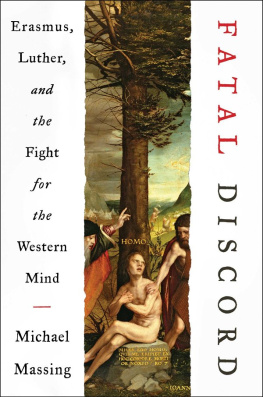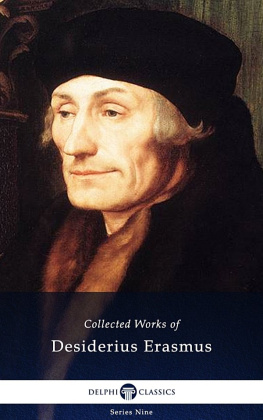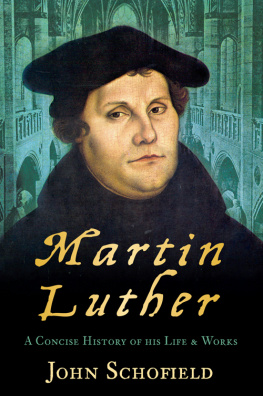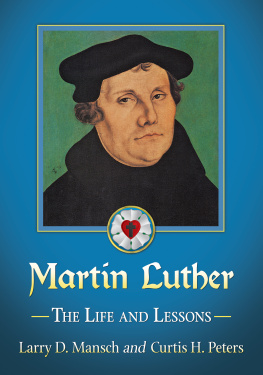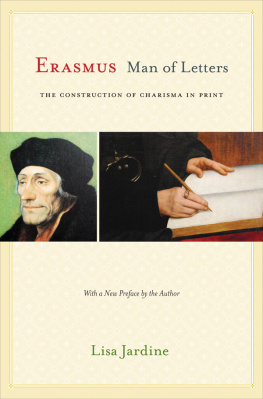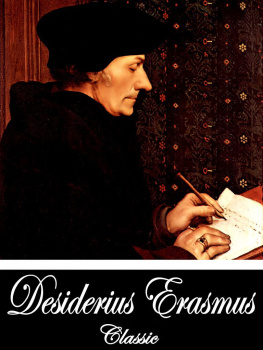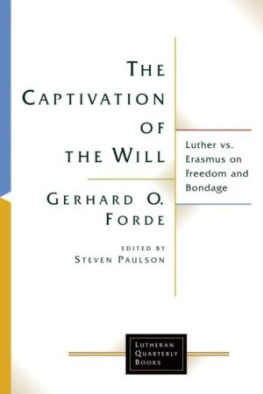Toward the end of the year 1516, Erasmus of Rotterdam, then living in the Low Countries, received a letter from George Spalatin, the secretary to Frederick the Wise of Saxony. After expressing his esteem for the Dutch humanist, Spalatin explained that he was writing on behalf of an Augustinian priest, whom he did not name. The priest had read Erasmuss recently published annotations on the New Testamentnotes on the Latin translation known as the Vulgateand had two concerns. One related to original sin. Erasmus, the priest believed, had misunderstood Pauls position on this doctrine and urged him to read Augustines commentary on it, which, he felt, would set him right. He also objected to Erasmuss understanding of works. Erasmus seemed to feel that Paul, in rejecting the performance of works, was referring only to rites and ceremonies when in fact he meant works of all kinds, including the keeping of the Ten Commandments. The priest wanted to make sure that Erasmus understood this, since, given his great prestige, he might otherwise lead people astray.
The priest was Martin Luther. Thirty-three years old at the time, he was a little-known friar and Bible professor in the eastern German town of Wittenberg. He had just completed a long series of lectures on Pauls Epistle to the Romans, delivered in a weather-beaten hall to a small group of clerics and students. Erasmus, who was about fifty, was Europes most celebrated scholar. Kings, dukes, and cardinals all vied to bring him to their lands. He was an associate of Pope Leo X, a friend of Henry VIII of England, and a councilor to Charles V, the Holy Roman Emperor. He was also Europes bestselling author. Thanks to his mastery of the new medium of print, Erasmus was the first person in Europe able to live off the income from his writing, and at the Frankfurt book fair every spring and autumn, his books regularly sold out.
Several times a week, Erasmus received a bundle of letters from around Europe, providing news, offering praise, seeking his opinions. He was unable to respond to them all, and he paid little attention to the complaints of the anonymous priest. The following October, however, Luther would post his Ninety-Five Theses in Wittenberg, challenging the Roman Churchs practice of selling indulgences. These certificates, by remitting the penalties imposed on sinners for their transgressions, reduced the amount of time they had to spend in purgatory before being admitted to heaven. To Luther, they seemed to turn repentance into a form of barter, and he proposed his theses as an invitation to debate. No one accepted it, but within weeks his protest appeared in print, and as copies circulated around Germany, he became a household name.
Initially, the Church ignored the impertinent friar, assuming the matter would blow over, but Luthertenacious, blunt, fearlessspoke out ever more forcefully against what he saw as Romes laxity, venality, and exploitation of ordinary Christians. And many of those Christiansburdened by tithes and fees and the sanctions imposed for not paying themrallied to his cause. As opposition surged, Rome finally moved to silence Luther, but the harder it tried to suppress him, the more outspoken he became, until finally he was questioning the authority of the pope himself. No ecclesiast, however lofty, he declared, could tell a Christian how to behave or think. By the summer of 1520, the threat posed by Luther had become so great that Pope Leo X signed a bull threatening to excommunicate him if he did not appear in Rome and recant. Luther responded by burning the bull. Demanding an independent hearing, he finally got one in April 1521, when he was summoned before the Imperial Diet of the German nation, meeting in Worms. Standing before the emperor and a phalanx of imperial and ecclesiastical officials, Luther refused to retract what he had written, declaring that he could not act against his conscience.
This moment, when a lone individual appealing to his conscience stood fast before the highest authorities in the land, is considered by many a milestone in Western historythe moment when the medieval gave way to the modern. Luthers defiance would inspire a broad revolt against Romethe Protestant Reformationthat would break the thousand-year hold of the Church on the spiritual life of the West.
It would also push Erasmus off the historical stage. In just a few years, the Dutchman would go from being Europes most renowned thinker to a largely ignored figure, scorned by both Catholics (for being too critical of the Church) and Protestants (for being too timid). After his death, in 1536, Erasmus was all but forgotten as Europe experienced a century of religious strife. Even today, his works are only sporadically read, and his ideas receive scant attention. They deserve to be revived. For Erasmus was an architect of the Northern Renaissance. While Leonardo, Michelangelo, and Raphael were revolutionizing Western art and culture, Erasmus was helping to transform the continents intellectual and religious life. In some ways, he represents the path not taken. At a time of rising nationalism, he was a committed internationalist. In an age of persecution and incessant war, he urged tolerance and promoted peace, and he argued that religion should be more about conduct than doctrine. Erasmus was, in short, the leading exponent of Christian humanism, extolling human dignity, modest piety, and brotherhood in a world gripped by zealotry, rancor, and sectarianism.
In his books and essays, Erasmus laid out a program to reform and revitalize European culture. His Enchiridion Militis Christiani (The Handbook of the Christian Soldier) became a manual for Europes growing middle class as it sought a form of inner spirituality more fulfilling than the performance of formal acts like going to confession or visiting a shrine. The Praise of Folly, with its barbed put-downs of pedantic theologians and self-seeking princes, helped puncture the pretensions and excesses of Europes ruling elite. The Adages, a thick compendium of aphorisms culled from ancient Greece and Rome and explained in lively essays, did more than any other work to revive interest in classical culture. Erasmuss treatises on education helped shape Western pedagogy for centuries, and his Colloquiescolorful dialogues and sketches based on everyday lifeoffered sharp observations on the customs and conventions of sixteenth-century Europe.
Above all, Erasmus revolutionized the study of the Bible. At the time, the Vulgate was the source of all teaching and doctrine in the Western Church, its language consecrated by centuries of tradition and decree. Prepared during the waning days of imperial Rome, it was a Latin translation from the original Greek (in the case of the New Testament) and Hebrew (in the case of the Old). And its accuracy was coming under challenge. Many of its words and phrases seemed to diverge from their original meaning, and misspellings and other errors had been introduced by nodding scribes. Intent on correcting it, Erasmus spent years struggling to learn Greek so that he could read old manuscripts of the New Testament in its original tongue. In 1516, after much toil, he came out with his revised edition, which included a Greek text, an emended Latin translation, and annotations explaining the reasoning behind his changes.
Erasmuss new New Testament, offering scholars and exegetes a comprehensive apparatus for reading the Bible anew and arriving at their own interpretations, set off an explosion across Europe. It was to the study of Scripture what Copernicuss On the Revolutions of the Heavenly Spheres (first printed in 1543) was to the study of astronomy. Just as the Polish astronomer shattered the idea that the earth was the center of the heavens, so did the Dutch humanist seek to bring Scripture down from heaven to earth. From that point on, the Bible would be seen by many as a document that, though divinely inspired, had been fashioned by human hands and which could be deconstructed and edited in the same manner as a text by Livy or Seneca.

